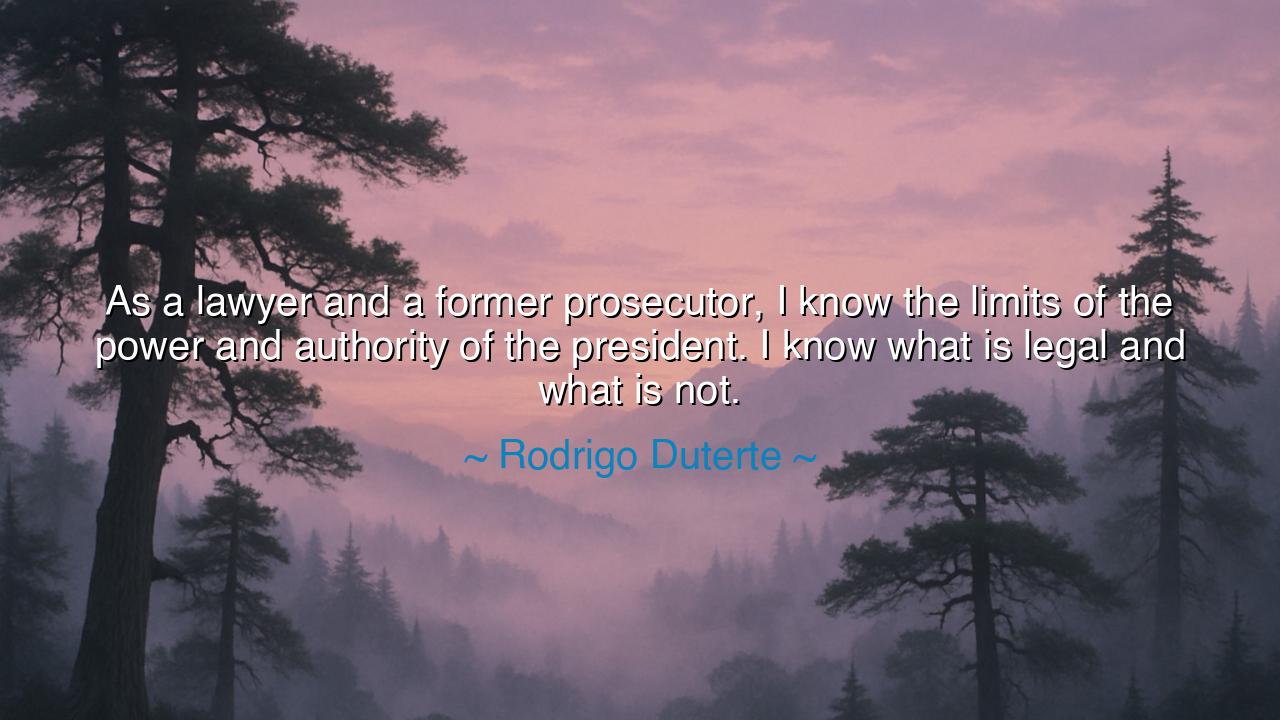
As a lawyer and a former prosecutor, I know the limits of the
As a lawyer and a former prosecutor, I know the limits of the power and authority of the president. I know what is legal and what is not.






Hear the words of Rodrigo Duterte, once a prosecutor, later president, who declared: “As a lawyer and a former prosecutor, I know the limits of the power and authority of the president. I know what is legal and what is not.” These words, though spoken by a man often regarded as fierce and unyielding, remind us of an eternal truth: that even the highest throne on earth is bound by the chains of law, and that the ruler’s hand must never rise above the measure of justice.
The origin of these words lies in Duterte’s dual identity—lawyer and prosecutor before becoming leader of a nation. He speaks from the vantage of one who has seen the machinery of justice from within, who has studied the statutes, cross-examined the guilty, and weighed the evidence of crime. When he ascended to the presidency, he carried with him not only the power of command but the memory of limits, the knowledge that even kings are not free to act without regard for what is legal.
This theme is as old as civilization. Consider the tale of Solon of Athens, who gave the Athenians laws to restrain even the most powerful. Solon declared that no man, not even a tyrant, should stand above the law, and in his wisdom he laid down statutes that bound both ruler and ruled. Or recall the story of Magna Carta in England, where barons rose against King John and forced him to swear that the crown itself would be restrained by law. These are echoes of the same truth Duterte invoked: that authority has boundaries, and true power knows where it must halt.
Yet history also warns of rulers who forgot this truth. Nero of Rome claimed divine right to do as he pleased, and his empire was poisoned by his excesses. In more recent times, dictators who despised legal limits wielded their nations like weapons, leaving only ashes behind. Their downfall is proof that power without law is not strength but madness, and that the highest glory of a leader lies in restraint, not indulgence.
Duterte’s words may also be read as a declaration to his critics—that though his ways were often harsh, he claimed to act with an awareness of boundaries, insisting that he knew the difference between what is lawful and what is not. Whether one agrees with his claim or doubts it, the principle he invokes remains timeless: that leaders must measure their deeds not only by what they desire, but by what the law allows.
The lesson, then, is clear: power without law is tyranny, but law without respect is weakness. Every man, whether ruler or citizen, must acknowledge limits. Authority is not license. Influence is not immunity. To live rightly is to understand not only what one can do, but what one must not do. For freedom is preserved not by the strength of rulers, but by their willingness to be bound by justice.
Therefore, in your own life, learn from this teaching. Know the limits of your power, whether in family, in work, or in community. Use authority to serve, not to dominate. When tempted to act beyond what is just, remember that every deed leaves a mark on the soul, and no man escapes the judgment of time. The laws of men may bind your hands, but the law of conscience binds your heart.
So let the words of Rodrigo Duterte echo across generations: the mightiest leader is still bound by law, and the truest sign of wisdom is knowing where power ends. Walk, then, with strength guided by restraint, and let your legacy be one of justice, not excess.






AAdministratorAdministrator
Welcome, honored guests. Please leave a comment, we will respond soon